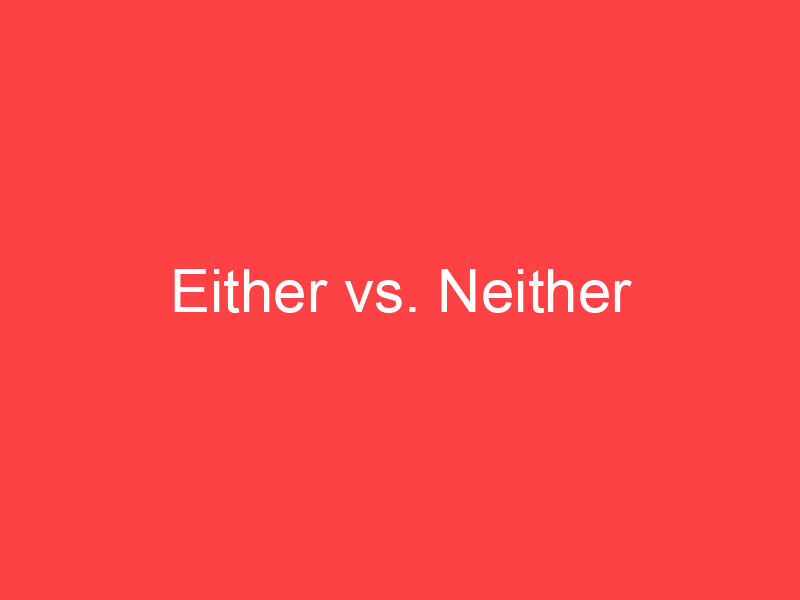-
Either (determiner)
One of two.
“You can have it in either colour.”
-
Either (determiner)
Each of two; both. from 9th c.
“There is a locomotive at either end of the train, one pulling and the other pushing.”
-
Either (pronoun)
One or other of two people or things.
“He made me two offers, but I did not accept either.”
-
Either (pronoun)
Both, each of two or more.
-
Either (adverb)
As well.
“I don’t like him, and I don’t like her either.”
-
Either (conjunction)
Introduces the first of two (or occasionally more) options or possibilities, the second (or last) of which is introduced by “or”.
“Either you eat your dinner or you go to your room.”
“You can have either potatoes or rice with that, but not both.”
“You’ll be either early, late, or on time.”
-
Neither (determiner)
Not one of two; not either.
“Neither definition seems correct.”
-
Neither (pronoun)
not either one
“… because neither is correct.”
-
Neither (conjunction)
Not either (used with nor).
“Neither you nor I like it.”
“Neither now, nor ever will he forsake his mother.”
-
Neither (adverb)
similarly not
“Neither can she stop him, nor can he stop her.”
“Just as you would not correct it, neither would I.”
-
Either (conjunction)
used before the first of two (or occasionally more) given alternatives (the other being introduced by ‘or’)
“either I accompany you to your room or I wait here”
“available in either black or white”
-
Either (conjunction)
used to indicate a similarity or link with a statement just made
“it won’t do any harm, but won’t really help either”
“You don’t like him, do you? I don’t either”
-
Either (conjunction)
for that matter; moreover
“I was too tired to go. And I couldn’t have paid, either”
-
Either (adverb)
used before the first of two (or occasionally more) given alternatives (the other being introduced by ‘or’)
“available in either black or white”
“either I accompany you to your room or I wait here”
-
Either (adverb)
used to indicate a similarity or link with a statement just made
“it won’t do any harm, but won’t really help either”
“You don’t like him, do you? I don’t either”
-
Either (adverb)
-
Either (adverb)
for that matter; moreover
“I was too tired to go. And I couldn’t have paid, either”
-
Either (determiner)
one or the other of two people or things
“there were no children of either marriage”
“their mortgage will be repaid if either of them dies”
-
Either (determiner)
each of two
“the road was straight, with fields on either side”
-
Either (pronoun)
one or the other of two people or things
“their mortgage will be repaid if either of them dies”
“there were no children of either marriage”
-
Either (pronoun)
-
Either (pronoun)
each of two
“the road was straight, with fields on either side”
-
Neither (determiner)
not the one nor the other of two people or things; not either
“neither side of the brain is dominant over the other”
“neither of us believes it”
-
Neither (pronoun)
not the one nor the other of two people or things; not either
“neither side of the brain is dominant over the other”
“neither of us believes it”
-
Neither (adverb)
used before the first of two (or occasionally more) alternatives (the others being introduced by ‘nor’) to indicate that they are each untrue or each does not happen
“I am neither a liberal nor a conservative”
-
Neither (adverb)
used to introduce a further negative statement
“he didn’t remember, and neither did I”

